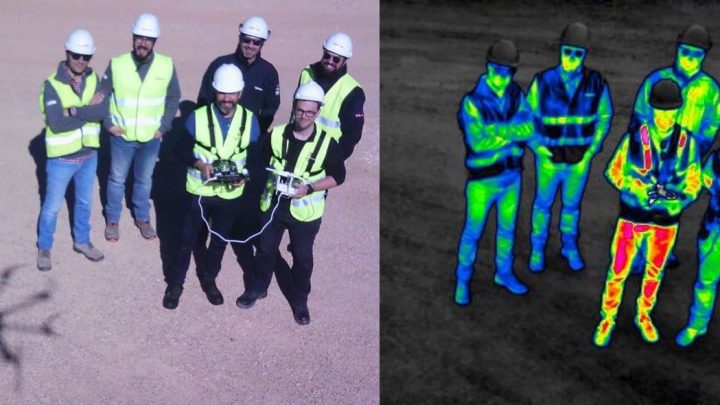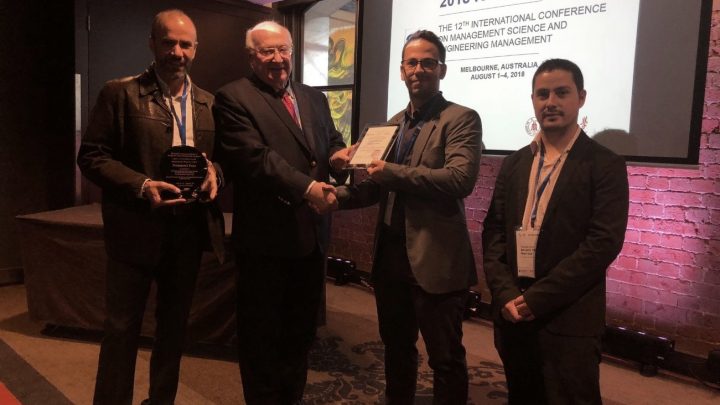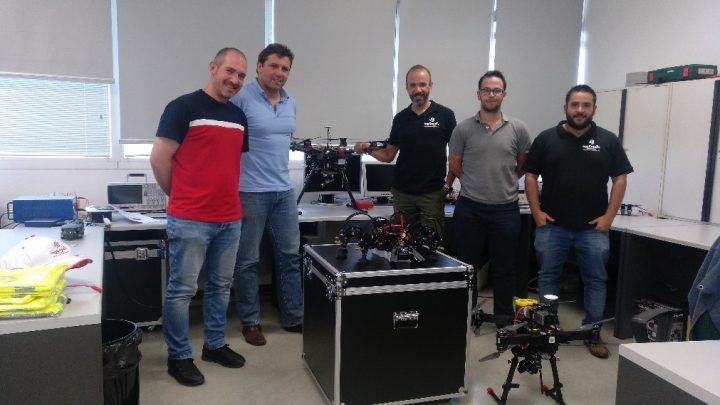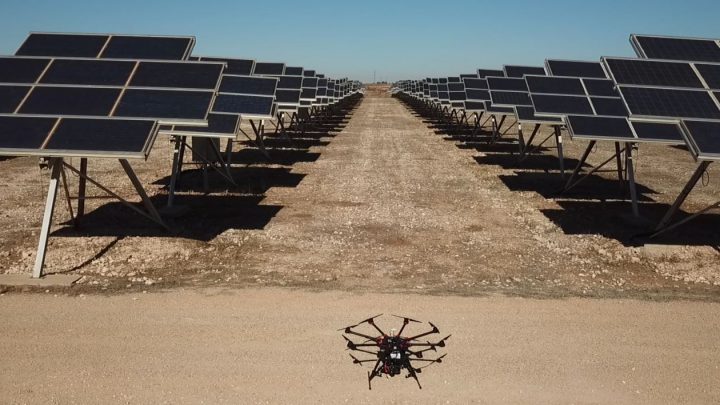"The objective of this R&D project, financed by the Ministry of Economy and Competitiveness within the framework of the State Plan for Scientific and Technical Research and Innovation 2013-2016, is the development of an intelligent tool based on monitoring systems embedded in UAVs for the optimization of the operation and maintenance of solar photovoltaic plants."
SCARAB
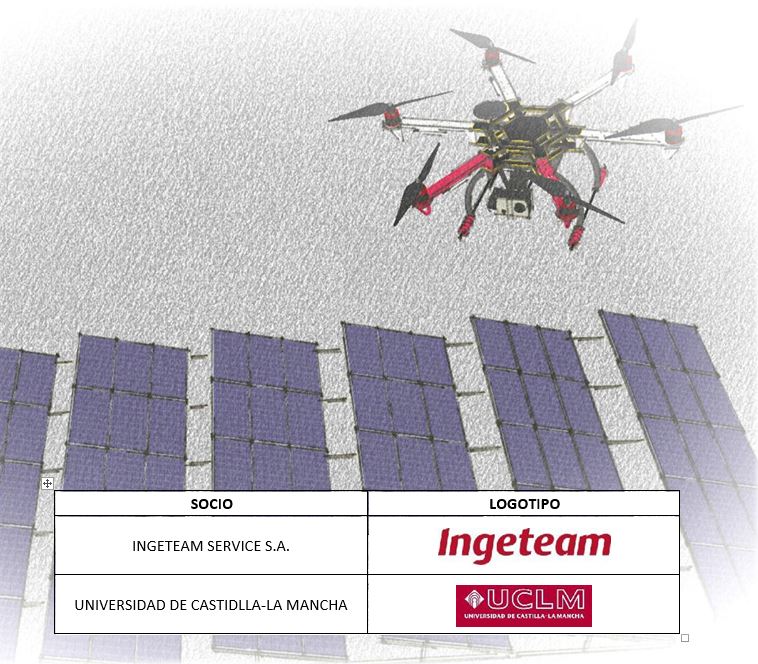
GRANT AGREEMENT ID: RTC-2016-5694-3
GRANTED: € 648.510
FUNDED:
![]()
1 October 2016 31 December 2019
TITLE: Herramienta Inteligente de Optimización de la Operación y el Mantenimiento de Plantas Fotovoltaicas, basada en nuevos sistemas de monitorización embarcados en UAVs
The main objective of the SCARAB project is to develop a support system for the operation and maintenance of photovoltaic plants composed of the following sub-systems:
Unmanned aerial vehicle (UAV or drone) adapted to accommodate different sensors and follow different trajectories according to the technology and type of installation of the photovoltaic panel;
- Algorithms that allow to detect and classify the possible causes of reduction of the performance of the panels such as breakage, dirt or degradation;
- Algorithms that, based on on-board sensors and other plant information, will provide reliable and robust indicators of the technical and economic performance of the system;
- Application optimization of maintenance activities.
With all this, it will help to respond to the main challenge facing photovoltaic solar plants: achieve a high profitability that allows them to compete with other sources of energy, both fossil and renewable. The improvements that the project will bring at the operational level include the elimination of lifting means for the inspection of panels, reducing the time taken for measurements and post-processing, and facilitating decision-making in order to carry out the operation and maintenance activities with the minimum costs and maximizing the life time of the plant.
At a technical level, the SCARAB project addresses the development of new technologies in two branches:
1.Monitoring and signal processing for the inspection and automatic detection of faults in photovoltaic panels through the use of more efficient sensors
2.Information technologies, developing advanced fault classification algorithms, estimating the status of the solar plant and optimizing maintenance strategies.
In relation to the first line of action, they are beginning to use unmanned vehicles for the inspection of photovoltaic plants using thermographic or visible-spectrum cameras, which allows reducing the time taken for measurements. However, the expensive post-processing of the information captured to detect faults is done in a traditional way, reviewing the images one by one. For this reason, the present project raises the automation of the analysis to complement the reduction of time and costs achieved with aerial inspection with the additional optimization that is achieved with the automatic diagnosis from the collected data.
In relation to the second technological line, it is intended to go beyond the current state of the art by developing intelligent algorithms that use the failure indicators detected with the previous sub-system and the correlations with the most relevant exogenous information (power produced, climatology, costs of energy and labor, repair times, etc.). As a result, the plant operator will have a decision support tool to determine the optimal maintenance strategy.
In the present report a Work Plan has been proposed with a duration of 36 months, which covers the technical objectives described, and which is structured in 8 work packages.
In short, the SCARAB project is aligned with the needs of society (Challenges) and with the national technological development agendas (National Renewable Energy Plan 2011-2020) and European (H2020) as explained in the chapter on «Internationalization» of this proposal. The execution of the project would not only allow the development of necessary solutions for society and competitiveness, but would strengthen the international leadership capacity in emerging markets and in future R & D & I projects.

The general objective of the SCARAB project is to increase the efficiency and effectiveness of operation and maintenance activities in photovoltaic solar plants. To this end, new technologies for automation of inspections, diagnosis and intelligent analysis of information will be developed, which will support the company providing maintenance services and significantly improve its competitiveness.
After reviewing current practices, it has been decided to focus on technological development to solve four O & M processes that are currently susceptible to improvement and would have a great impact on time and costs:
1. Eliminate the use of lifting equipment (cranes) and the need for work at height that involves a high cost and a risk.
2. Accelerate the thermal measurements of panel diagnostics
3. Allow more frequent inspections.
4. Facilitate the analysis of the collected data to detect faults in PV panels and determine their severity.
5. Facilitate the analysis of the global state of the system and its economic performance.
6. Plantear optimal O & M strategies that contribute to lengthen the life time of the plant.
The project will achieve important strategic objectives for Ingenium and Ingeteam Service by developing and incorporating new knowledge and offering the market advanced services that position it in advantage over its competitors. The results that are expected to be obtained are not only aimed at the photovoltaic sector, but will be extrapolated to other sectors such as wind or industrial. In order to achieve the general objectives, there are a series of preliminary stages and scientific-technical objectives that must be addressed and that at the same time allow to evaluate the progress of the project.
These are described below:
O1 Integrate sensors on board drone.
This objective groups all the activities necessary to automate the tasks prior to the inspection of the panels: 1) move from one panel to the next sequentially and 2) positioning the sensor with the appropriate angle with respect to the point to be measured. For each tracking technology: fixed, 1-axis and 2-axis, there are specific requirements and limitations. In many cases lifting means are required to take the measurement at the moment when the panel is facing upwards, beyond the reach of the technician. Otherwise, the measure would not be made under the right conditions to detect failures. For this reason, it is necessary to consider the casuistry of photovoltaic plants and develop an electromechanical system (power supply, mechanical fixation, delimitation and orientation) to mount the sensors on an air vehicle that has sufficient range, autonomy and power for it.
O2 Automate the taking of measures indicative of the state of health of the PV panels.
The detection of faults and loss of performance in photovoltaic panels can be due to multiple causes and manifested in several ways. This technological objective is oriented to: 1) characterize the faults in PV panels; 2) specify, select and adapt the data acquisition module, the UAV and different commercially available sensors to detect problems in different photovoltaic technologies; 3) specify and develop an automatic and configurable aerial inspection system with parameters such as the route, the sampling frequency, the height and inclination of the panels, etc.
O3 Automate the PV panel diagnostics.
After the flight mission of the UAV, sensor data is received, predictably in a ground equipment. To avoid the need for expensive analysis by a thermography expert or the detection technique used, the next objective is to automate the interpretation of the data. To do this, algorithms must be developed that extract fault indicators, determine if they are outside the optimum operating range and classify the deviation. In this way, considerable savings are expected in terms of time and costs, which can be decisive both in small distributed plants and in plants of several hundred MW.
O4 Generate robust performance and degradation indicators both at the panel level and at the plant level.
In addition to the specific faults that may be encountered during the inspection of the panels, it is important to detect progressive losses of performance that are generally produced by the degradation of the cells or by the accumulated dirt on their surface. This objective could not be achieved without taking into account the environmental conditions in which the measures are carried out and without having historical data. Therefore, variables of the plant SCADA and other relevant information must be acquired (energy price, weather forecasts, etc.), develop variable correlation algorithms and develop comparison and trend detection algorithms with historical data.
O5 Generate software tools for optimal operation and maintenance of PV plants.
Having reliable information about the state of health of the photovoltaic panels and the plant as a whole is useless if that information is not assimilated and used to make decisions that improve the situation through operation and maintenance. The objective is, therefore, to provide the information to the operator in such a way that he can make better decisions. Said tool should consider not only technical but also economic parameters, and provide a quantitative estimate of the impact that a certain action would have on the performance of the system.
2020
Jesús José, Jesús José Llandres, Carlos Quiterio Gómez Muñoz, Fausto Pedro Garcia Marquez (2020) Non-destructive methods for detection and localisation of partial discharges, Non-Destructive Testing and Condition Monitoring Techniques for Renewable Energy Industrial Assets, p. 177-193, url, doi:https://doi.org/10.1016/B978-0-08-101094-5.00012-5
Alvaro Huerta Herraiz, Alberto Pliego Marugan, Fausto Pedro Garcia Marquez (2020) Photovoltaic plant condition monitoring using thermal images analysis by convolutional neural network-based structure, Renewable Energy 153, p. 334-348, url, doi:https://doi.org/10.1016/j.renene.2020.01.148
Jose Carlos Montoya, Carlos Quiterio Gomez Muñoz, Fausto Pedro Garcia Marquez (2020) Remote condition monitoring for photovoltaic systems, Non-Destructive Testing and Condition Monitoring Techniques for Renewable Energy Industrial Assets, Fausto Pedro García Márquez and Alexander Karyotaki Mayorkinos Papaelias (ed.), p. 133-142, Butterworth-Heinemann, url, doi:https://doi.org/10.1016/B978-0-08-101094-5.00009-5
Jose Carlos Montoya, Carlos Quiterio Gomez Muñoz, Fausto Pedro Garcia Marquez (2020) Chapter 9 – Remote condition monitoring for photovoltaic systems, Non-Destructive Testing and Condition Monitoring Techniques for Renewable Energy Industrial Assets, Mayorkinos Papaelias, Fausto Pedro García Márquez, Alexander Karyotakis (ed.), p. 133-142, Boston: Butterworth-Heinemann, url, doi:https://doi.org/10.1016/B978-0-08-101094-5.00009-5
Jesus Jose Llandres, Carlos Quiterio Gomez Muñoz, Fausto Pedro Garcia Marquez (2020) Chapter 12 – Non-destructive methods for detection and localisation of partial discharges, Non-Destructive Testing and Condition Monitoring Techniques for Renewable Energy Industrial Assets, Mayorkinos Papaelias, Fausto Pedro García Márquez, Alexander Karyotakis (ed.), p. 177-193, Boston: Butterworth-Heinemann, url, doi:https://doi.org/10.1016/B978-0-08-101094-5.00012-5
Alvaro Huerta Herraiz, Alberto Pliego Marugan, Fausto Pedro Garcia Marquez (2020) Chapter 7 – A review on condition monitoring system for solar plants based on thermography, Non-Destructive Testing and Condition Monitoring Techniques for Renewable Energy Industrial Assets, Mayorkinos Papaelias, Fausto Pedro García Márquez, Alexander Karyotakis (ed.), p. 103-118, Boston: Butterworth-Heinemann, url, doi:https://doi.org/10.1016/B978-0-08-101094-5.00007-1
2019
Fausto Pedro Garcia Marquez, Benjamin Lev (ed.) (2019) Data Science and Digital Business, p. 316, Springer, Cham, url, doi:doi 10.1007/978-3-319-95651-0
Alfredo Peinado Gonzalo, Alberto Pliego Marugán, Fausto Pedro García Márquez (2019) A review of the application performances of concentrated solar power systems, Applied Energy 255, p. 113893, Elsevier, url, doi:10.1016/J.APENERGY.2019.113893
Fausto Pedro Garcia Marquez, Isaac Segovia Ramirez (2019) Condition monitoring system for solar power plants with radiometric and thermographic sensors embedded in unmanned aerial vehicles, Measurement 139, p. 152-162, url, doi:https://doi.org/10.1016/j.measurement.2019.02.045
Alfredo Arcos Jimenez, Carlos Quiterio Gomez Muñoz, Fausto Pedro Garcia Marquez (2019) Dirt and mud detection and diagnosis on a wind turbine blade employing guided waves and supervised learning classifiers, Reliability Engineering & System Safety 184, p. 2-12, url, doi:https://doi.org/10.1016/j.ress.2018.02.013
2018
Isaac Segovia Ramirez, Alberto Pliego Marugan, Fausto Pedro Garcia Marquez, Alvaro Huerta Herraiz, Marcos Navarro Leal, Ignacio Garcia de Carellan Esteban-Infantes (2018) SCARAB: Herramienta inteligente de optimización de la operación y el mantenimiento de plantas fotovoltaicas, basada en nuevos sistemas de monitorización embarcados en UAVs, AEND 85, p. pp 32-41, url
Alberto Pliego Marugan, Raúl Ruiz de la Hermosa, Fausto Pedro Garcia Marquez (2018) Big Data and Wind Turbines Maintenance Management, Renewable Energies, p. 111-125, Springer, url, doi:https://doi.org/10.1007/978-3-319-45364-4_8
Victoria Borja Moraleda, Alberto Pliego Marugan, Fausto Pedro Garcia Marquez (2018) Acoustic Maintenance Management Employing Unmanned Aerial Vehicles in Renewable Energies, International Conference on Management Science and Engineering Management, p. 969-981, Springer, Cham, url, doi:https://doi.org/10.1007/978-3-319-93351-1_76
Carlos Quiterio Gomez Muñoz, Fausto Pedro Garcia Marquez (2018) Future Maintenance Management in Renewable Energies, Renewable Energies, p. 149-159, Springer, url, doi:https://doi.org/10.1007/978-3-319-45364-4_10
Alfredo Arcos Jimenez, Carlos Quiterio Gomez Muñoz, Fausto Pedro Garcia Marquez (2018) Dirt and mud detection and diagnosis on a wind turbine blade employing guided waves and supervised learning classifiers, Reliability Engineering & System Safety, Elsevier, url, doi:https://doi.org/10.1016/j.ress.2018.02.013
Isaac Segovia Ramirez, Alberto Pliego Marugan, Fausto Pedro Garcia Marquez (2018) Remotely Piloted Aircraft System and Engineering Managenment: A Real Case Study, International Conference on Management Science and Engineering Management, p. 1173-1185, Springer, Cham, url, doi:https://doi.org/10.1007/978-3-319-93351-1_920
Alvaro Huerta Herraiz, Alberto Pliego Marugan, Fausto Pedro Garcia Marquez (2018) Optimal Productivity in Solar Power Plants Based on Machine Learning and Engineering Management, International Conference on Management Science and Engineering Management, p. 983-994, Springer, Cham, url, doi:https://doi.org/10.1007/978-3-319-93351-1_77
Carlos Quiterio Gomez Muñoz, Fausto Pedro Garcia Marquez (2018) Wind Energy Power Prospective, Renewable Energies, p. 83-95, Springer, url, doi:https://doi.org/10.1007/978-3-319-45364-4_6
Jesús María Pinar Pérez, Fausto Pedro Garcia Marquez (2018) Managing Costs and Review for Icing Problems, Renewable Energies, p. 97-109, Springer, doi:https://doi.org/10.1007/978-3-319-45364-4_7
Mayorkinos Papaelias, Fausto Pedro Garcia Marquez, Isaac Segovia Ramirez (2018) Concentrated Solar Power: Present and Future, Renewable Energies, p. 51-61, Springer, url, doi:https://doi.org/10.1007/978-3-319-45364-4_4
2017
Fausto Pedro Garcia Marquez, Alberto Pliego Marugan, Jesus Maria Pinar Perez, Mayorkinos Papaelias (2017) An Approach for Dynamic Analysis of Electrical/Electronic Components in Wind Turbines, Energies 10(8), url
Kamal Mohammedi, Tahar Benmessaoud, Fausto Pedro Garcia Marquez, Alberto Pliego Marugan (2017) Fuzzy Logic Applied to SCADA Systems, Springer, url, doi:https://doi.org/10.1007/978-3-319-59280-0_61
Isaac Segovia Ramirez, Fausto Pedro Garcia Marquez, Carlos Quiterio Gomez Muñoz, Alfredo Peinado Gonzalo (2017) Online Fault Detection in Solar Plants Using a Wireless Radiometer in Unmanned Aerial Vehicles, Springer, url, doi:https://doi.org/10.1007/978-3-319-59280-0_96
Carlos Quiterio Gomez Muñoz, Fausto Pedro Garcia Marquez, Benjamin Lev, Alfredo Arcos Jimenez (2017) New Pipe Notch Detection and Location Method for Short Distances employing Ultrasonic Guided Waves, Acta Acustica united with Acustica, p. 772-781, url, doi:https://doi.org/10.3813/AAA.919106
Fausto Pedro Garcia Marquez, Alberto Pliego Marugan, Jesús María Pinar Pérez, Stuart Hillmansen, Mayorkinos Papaelias (2017) Optimal dynamic analysis of electrical/electronic components in wind turbines, Energies 10(8), p. 1111, Multidisciplinary Digital Publishing Institute, url, doi:doi:10.3390/en10081111
Fausto Pedro Garcia Marquez, Carlos Quiterio Gomez Muñoz, Benjamin Lev, Alfredo Arcos Jimenez (2017) New Pipe Notch Detection and Location Method for Short Distances employing Ultrasonic Guided Waves, url, doi:https://doi.org/10.3813/AAA.919106
Tahar Benmessaoud, Alberto Pliego Marugan, Kamal Mohammedi, Fausto Pedro Garcia Marquez (2017) Fuzzy Logic Applied to SCADA Systems, International Conference on Management Science and Engineering Management, p. 749-757, Springer, Cham, url, doi:https://doi.org/10.1007/978-3-319-59280-0_61
Carlos Quiterio Gomez Muñoz, Alfredo Peinado Gonzalo, Isaac Segovia Ramirez, Fausto Pedro Garcia Marquez (2017) Online Fault Detection in Solar Plants Using a Wireless Radiometer in Unmanned Aerial Vehicles, International Conference on Management Science and Engineering Management, p. 1161-1174, Springer, Cham, url, doi:https://doi.org/10.1007/978-3-319-59280-0_96
Alberto Pliego Marugan, Fausto Pedro Garcia Marquez, Benjamin Lev (2017) Optimal decision-making via binary decision diagrams for investments under a risky environment, International Journal of Production Research 55(18), p. 5271-5286, Taylor & Francis, url, doi:https://doi.org/10.1080/00207543.2017.1308570
Alfredo Arcos Arcos Jimenez, Carlos Quiterio Gomez Muñoz, Fausto Pedro Garcia Marquez (2017) Machine Learning and Neural Network for Maintenance Management, International Conference on Management Science and Engineering Management, p. 1377-1388, Springer, Cham, url, doi:https://doi.org/10.1007/978-3-319-59280-0_115
2016
Fausto Pedro Garcia Marquez, Mayorkinos Papaelias, Noor Zaman (2016) Non-Destructive Testing, Intech, url
PARTNERS
LAST NEWS IN SCARAB
Reunión de control del proyecto SCARAB en las instalaciones de Ingeteam Service S.A. el 13 de febrero de 2019
Ingenium research Group has been awarded by the Advancement Prize for Management Science and Engineering Management with the Nominated Prize (2018).
Workshop del Proyecto SCARAB en instalaciones de Ingenium Research Group en Ciudad Real el 12 de junio de 2018
Ingenium e Ingeteam trabajan en el nuevo proyecto SCARAB
Contact Us
- ESCUELA TÉCNICA SUPERIOR INGENIERÍA INDUSTRIAL
- ingeniumgroup.eu@gmail.com
- (+34) 926295300 (6230)
Copyright © 2019 INGENIUM GROUP.All rights reserved.
A bonis ad meliora



